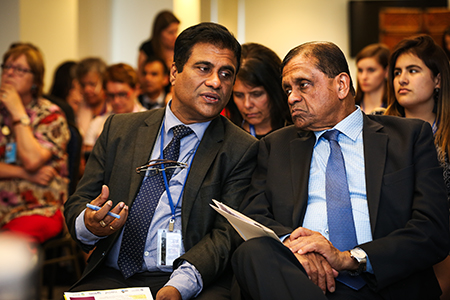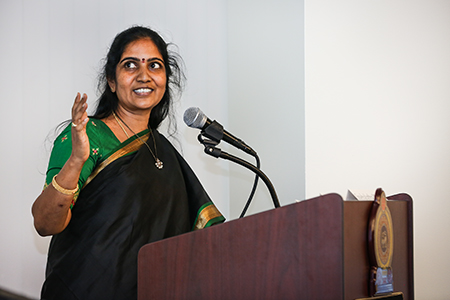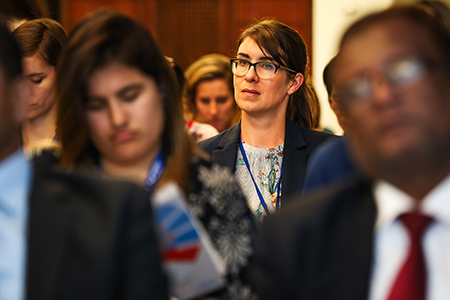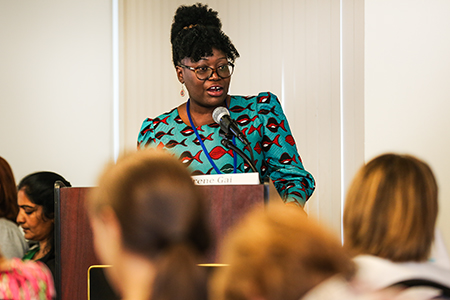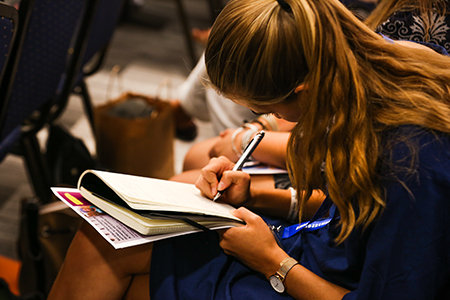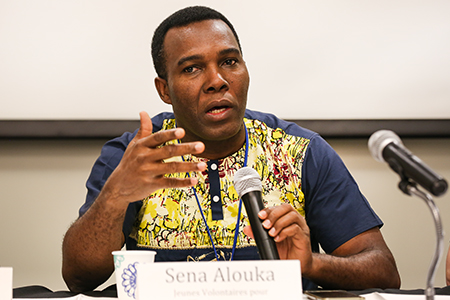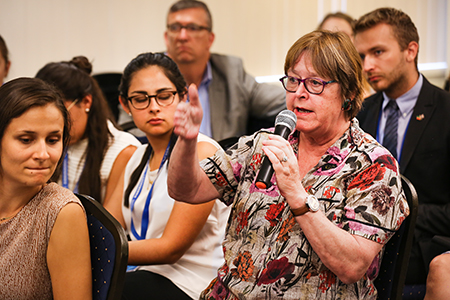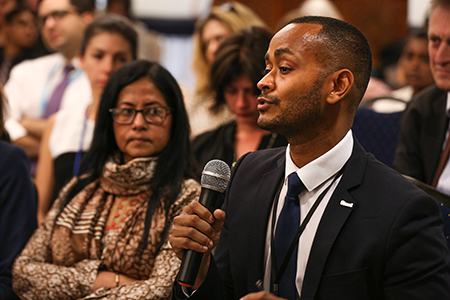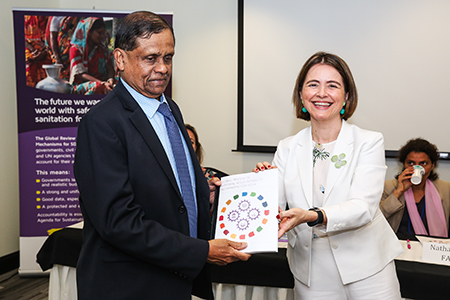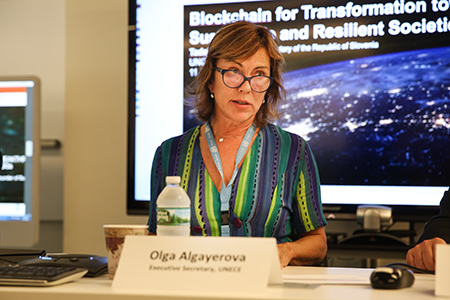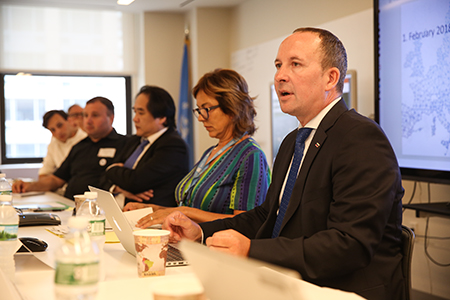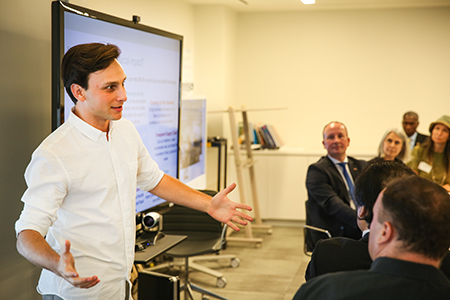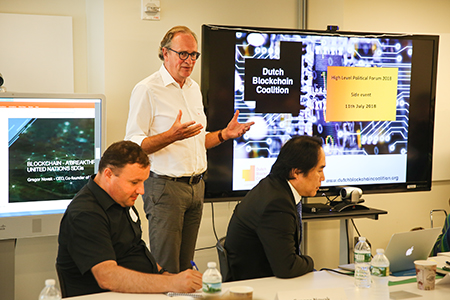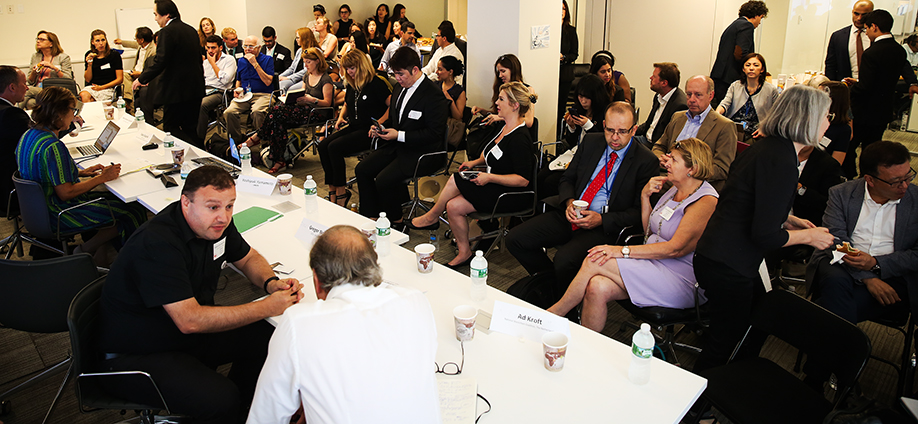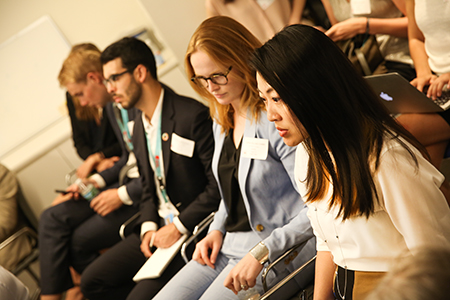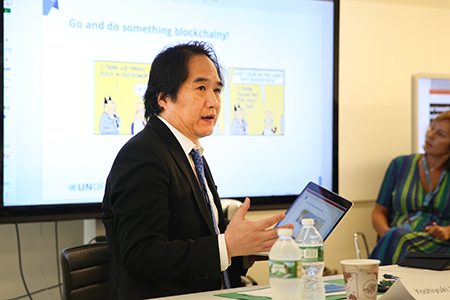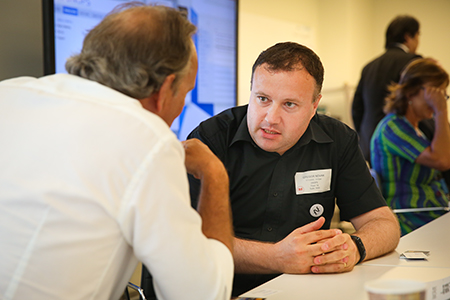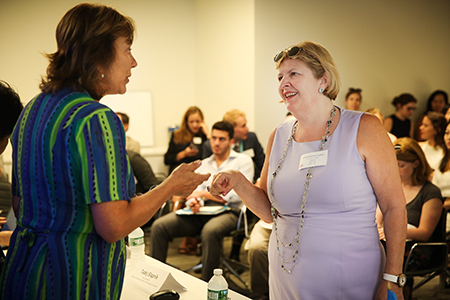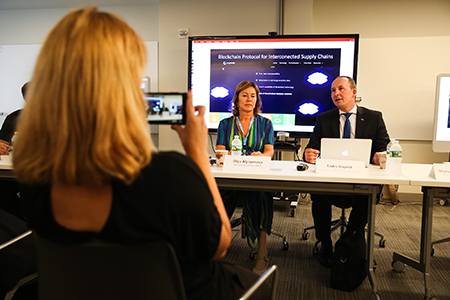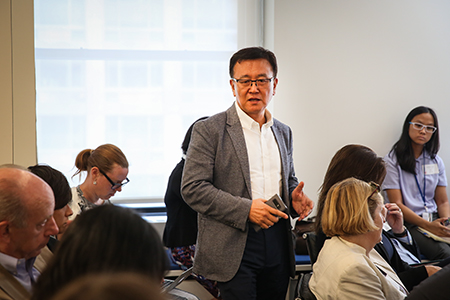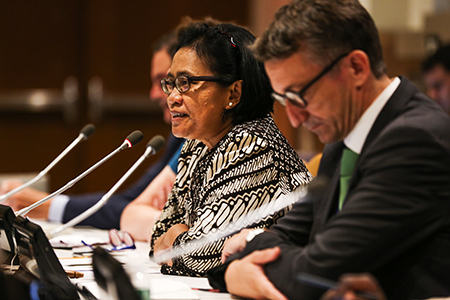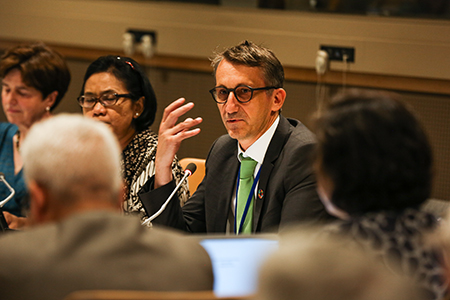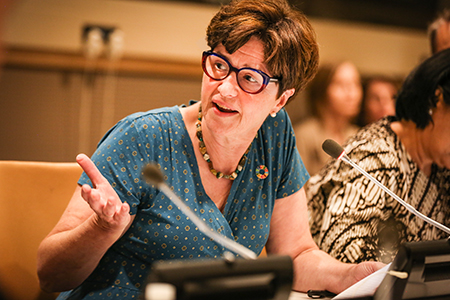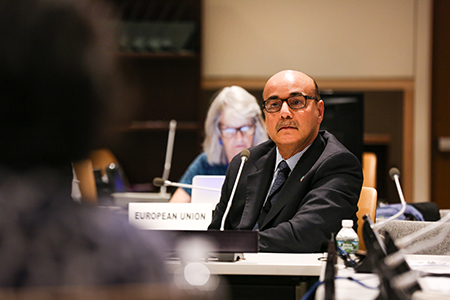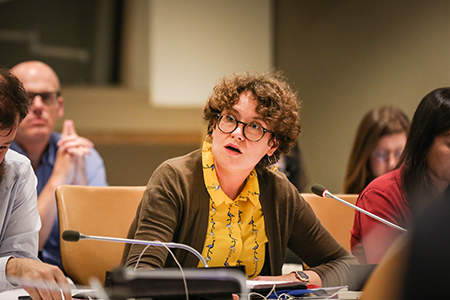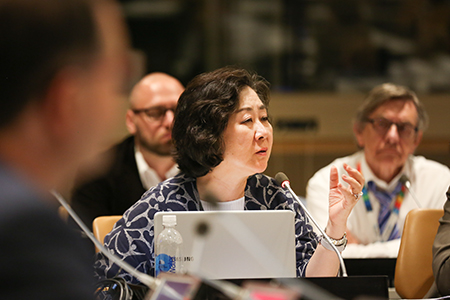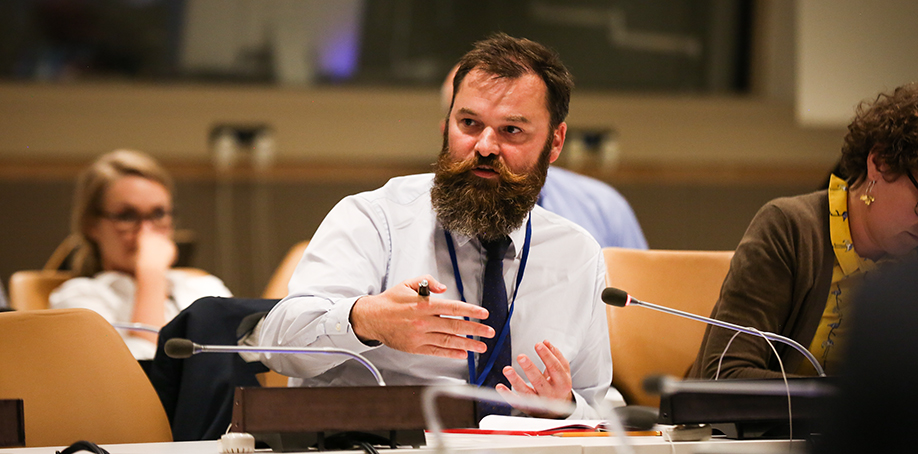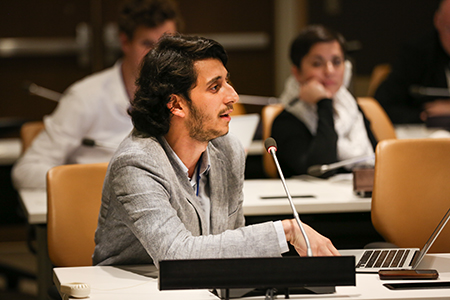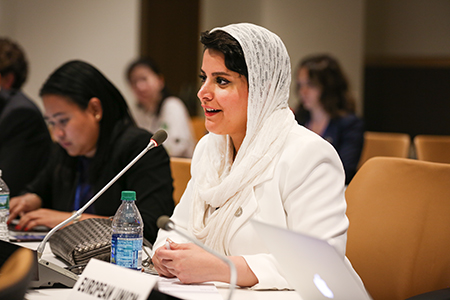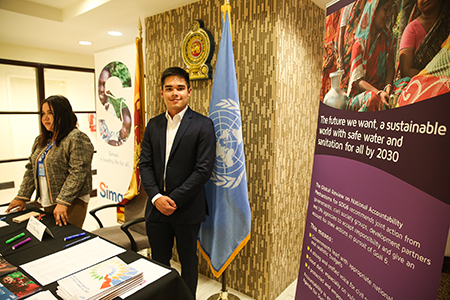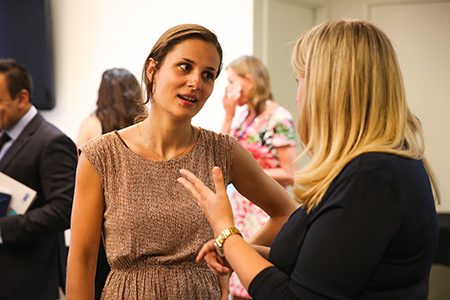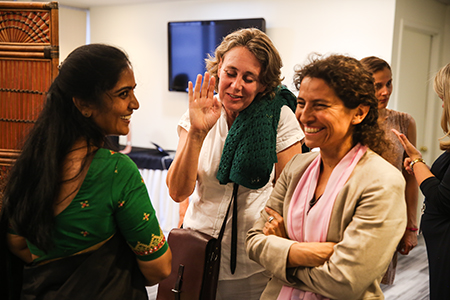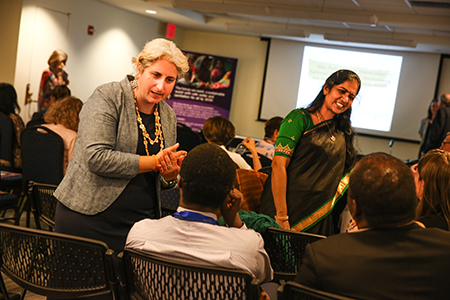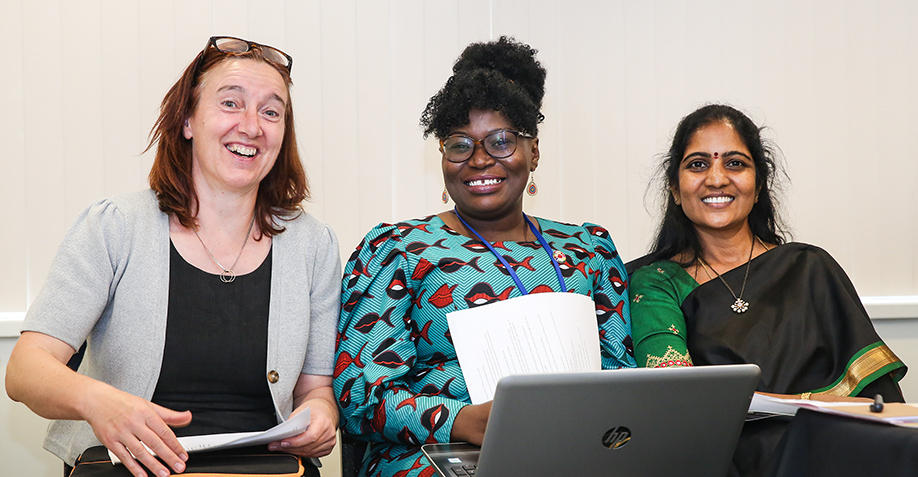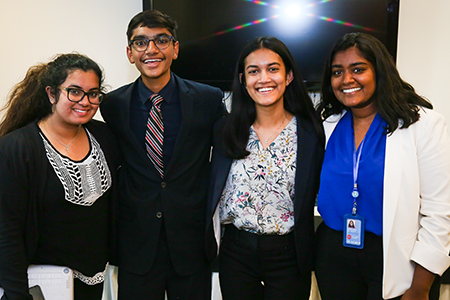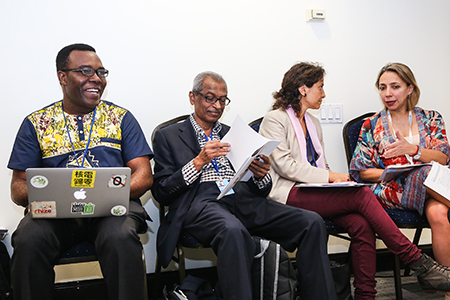Summary
The following events were covered by IISD Reporting Services on Wednesday, 11 July, 2018:
- Why Robust Multi-Stakeholder National Accountability Mechanisms are Essential for Achieving SDG 6
- Blockchain for Transformation: Towards Sustainable and Resilient Societies
- Global Sustainable Development Report (GSDR) Briefing by Independent Group of Scientists
Photos by IISD/ENB | Natalia Mroz
For photo reprint permissions, please follow instructions at our Attribution Regulations for Meeting Photo Usage Page
Why Robust Multi-Stakeholder National Accountability Mechanisms are Essential for Achieving SDG 6 Presented by the Water Supply and Sanitation Collaborative Council (WSSCC), in partnership with African Civil Society Network on Water and Sanitation (ANEW), Coalition Eau, End Water Poverty, (EWP), Freshwater Action Network Mexico (FANMEX), Freshwater Action Network South Asia (FANSA), Government of Kenya, Government of Nigeria, Government of Sri Lanka, Sanitation and Water for All (SWA), Permanent Mission of Sri Lanka to the UN, United Nations Development Programme (UNDP), and Watershed Consortium.
This side event convened to launch and discuss the findings of a global review on the effectiveness of national accountability mechanisms on progress towards the water and sanitation targets of SDG 6. The report is available online at: https://bit.ly/2KHTr4H
Moderator Catarina de Albuquerque, Sanitation and Water for All (SWA), stressed that the global review of national accountability mechanisms was conducted in 25 countries, in partnership with various CSOs worldwide. She said the study showed that accountability mechanisms are lacking in many countries and called for raising awareness among governments to ensure that multi-stakeholder mechanisms are effective and participatory in implementing the SDGs.
Amrith Rohan Perera, Permanent Representative of Sri Lanka to the UN, noted the importance of partnerships, including with private sectors, CSOs, and youth. He outlined Sri Lanka’s efforts to realize a sustainable and resilient society, focusing on clear and safe water and sanitation. He highlighted the importance of not losing the great motivation governments have shown during the HLPF to make the 2030 Agenda for Sustainable Development (2030 Agenda) a reality.
Snehalatha Mekala, Freshwater Action Network South Asia (FANSA), noted that effective accountability mechanisms for monitoring progress on SDG6 need a legal basis and regular, transparent, and participatory processes. She highlighted findings showing that accountability mechanisms are not available, even when countries report they are, and that they often are not effective. She outlined challenges, including: lack of a legal basis for existing accountability mechanisms; limited CSO participation; lack of diversity of stakeholders represented: insufficient financing and budget allocation; and the need for improved monitoring capacity of countries.
Irene Gai, Kenya Water for Health Organization (KWAHO) shared the results of a study that examined national accountability mechanisms in Kenya. She reviewed existing mechanisms and platforms for SDG 6, including CSO participation, and described key challenges, such as the need for harmonized data collection tools with targets and indicators and resources. She outlined key recommendations for governments and CSOs, including: the need for: enhanced inclusivity; increased transparency on budgets; building a stronger voice for CSOs; and improved CSO accountability to citizens.
Norma Munguia Aldaraca, Director of Global Issues, Ministry of Foreign Affairs, Mexico, reported on her country’s experiences with the voluntary national review (VNR) process, noting that data is always a problem. She said it takes time and knowledge for society to get acquainted with the SDGs and called for more involvement of municipalities and the private sector.
Ananda Jayaveera, Regional Sanitation Centre (RSC) and FANSA, Sri Lanka, emphasized mainstreaming CSO engagement and noted: his country’s efforts to establish a CSO platform and the importance of a service delivery system, especially for marginalized people.
Nathalie Seguin, Freshwater Action Network Mexico (FANMEX), said that CSOs participated in the negotiations processes for the 2030 Agenda, but that once adopted, they face more difficulties participating in national implementation. She noted current challenges, including: strengthening CSOs’ capacity to advocate for and engage in developing plans and indicators at the national level; and increasing collaboration with communities that are left behind. She called for the HLPF to consider a better mechanism for CSO participation and to accept CSOs’ shadow reports.
Sena Alouka, Jeunes Volontaires pour l'Environnement, speaking on behalf of the African Civil Society Network on Water and Sanitation (ANEW), spoke about the importance of CSO accountability, citing Burkina Faso as a positive example, and identifying the need for improved NGO governance.
Marianne Kjellén, Water & Ocean Governance Programme (WOGP), UNDP, described the role of UNDP and other UN agencies in supporting national governments and other institutions on national accountability mechanisms.
During the ensuing discussion, panelists identified promising ideas and inspirations and responded to participant questions, including on: linking the political sphere of the HLPF to the more legal sphere in Geneva; including SDGs in school curricula; the importance of partnerships to stop silo-thinking; producing and presenting shadow VNRs; and maintaining a comprehensive, not fragmented approach to the 2030 Agenda.
The close of the event included the official launch of the report, Global Review of National Accountability Mechanisms for SDG 6, with a presentation of the first copy to Ambassador Amrith Rohan Perera.
Amrith Rohan Perera (R), Permanent Representative of Sri Lanka to the UN, following his welcome address
Snehalatha Mekala, called for clarifying roles and responsibilities among CSOs to improve coordination
A participant at the event
Irene Gai, Kenya Water for Health Organization (KWAHO), said, in Kenya, to make a big splash, especially about service delivery, you go to the media
Nathalie Seguin, FANMEX, said the topic of accountability mechanisms is left out at the HLPF
A participant takes notes during the event
Saying effective mechanisms are important, Sena Alouka, speaking on behalf of the African Civil Society Network on Water and Sanitation (ANEW), said to know how deep the river is, you have to put two feet inside
A participant makes a comment during the event
A participant poses a question during the event
Amrith Rohan Perera, Permanent Representative of Sri Lanka to the UN, and moderator Catarina de Albuquerque, launched the new report on Global Review of National Accountability Mechanisms for SDG6
Contact:
- David Trouba
| David.Trouba@wsscc.org
More Information:
Blockchain for Transformation: Towards Sustainable and Resilient Societies
Presented by UN Economic Commission for Europe (UNECE), UN Office for Project Services (UNOPS), the Republic of Slovenia, and the Dutch Blockchain Coalition
This side event, moderated by Maria Rosaria Ceccarelli, UNECE, convened a roundtable to explore how blockchain technology can further the attainment of the SDGs.
Moderator Ceccarelli opened the event, noting the potential role of blockchain in contributing to the SDGs.
Olga Algayerova, Executive Secretary, UNECE, said blockchain technology, often known for its use in storing and tracking cryptocurrency transactions, such as Bitcoin, also can be applied to advance implementation and monitoring of the SDGs, inter alia: reducing food waste in the supply chain (SDG 12.3); ensuring consumers have relevant information for sustainable lifestyles (SDGs 12.6 and 12.7); and providing legal identities and financial services to refugees and the very poor (SDG 2).
Tadej Slapnik, State Secretary, Office of the Prime Minister, Slovenia, highlighted the relevance of blockchain technology in the context of shifts from centralized to decentralized to distributed economies in various sectors, including the energy market and food supply chain. He recounted that European companies have started to make use of blockchain technologies on personal data, and are exchanging experiences through public-private platforms, including the European Blockchain Hub, which promotes development of smart regulation; and capacity building.
Yoshiyuki Yamamoto, UNOPS, underscored the importance of rethinking sustainable development narratives to address the disconnect between what we say about technological use for SDGs and what is available, including virtual currencies and blockchain. He stressed the importance of personal identification and financial data use to make data management more resilient and sustainable.
Ad Kroft, Dutch National Blockchain Coalition, described existing and potential field applications in the Netherlands, including: energy; food security; childcare; and social security projects. He said use of blockchain technology in trade processes can help reduce transaction costs and lead to increased financial inclusion for many who cannot currently participate in the market.
Ben Siegel, Consensys, outlined a range of positive social impacts from using blockchain technology, including: alternate sources of funding peer-to-peer marketplaces; economy for the unbanked; self-sovereign identity; transparent supply chains; decentralized governance; and effective philanthropy. He said one of the most impactful thing his company does is to include beneficiaries throughout the process.
Gregor Novak, SunContract, described his project in Slovenia, saying it is the first in the world to connect energy producers and consumers using blockchain technology. He noted: the blockchain process removes intermediaries from the transaction so participants can set their own prices; all transactions are automatic; and the biggest obstacles faced by private businesses are legal and technical, such as access to the data.
During the ensuing discussion, topics included: promoting understanding of blockchain technology among governments through co-creation processes; smart regulations on blockchain; benefits of using blockchain technologies to streamline data management and communications tools within the UN; and the impact of General Data Protection Regulation (GDPR), an EU-wide legal framework for personal data privacy.
Olga Algayerova, UNECE, called for deepening public-private partnerships to ensure the security of blockchain use to gain the trust of regulators and traders
Tadej Slapnik, State Secretary, Office of the Prime Minister, Slovenia, called for efforts to make blockchain technologies less energy intensive
Ben Siegel, Consensys, underscored the vulnerability of identity, and said blockchain technology should not be used for data related to refugees
Ad Kroft, Dutch National Blockchain Coalition, said a fundamental element of a blockchain system is to establish an “unbreakable identity”
Panelists prepare for the session
Participants at the venue
Yoshiyuki Yamamoto, UNOPS, said it is crucial to identify problems when considering blockchain use for SDGs
Gregor Novak, said people didn’t believe blockchain technology could work for energy distribution because the industry is too regulated
Panelists and participants discuss after the session
Contacts:
- Maria Rosaria Ceccarelli
| maria.ceccarelli@un.org - Yoshiyuki Yamamoto
| yoshiyukiy@UNOPS.org
More Information:
Global Sustainable Development Report (GSDR) Briefing by Independent Group of ScientistsPresented by the GSDR Independent Group of Scientists and the UN Department of Economic and Social Affairs (UN DESA).
Shantanu Mukherjee, UN DESA, explained that the event was a “briefing and a chat,” allowing the scientist members of the GSDR group to report on the status of the next quadrennial report and to have a face-to-face discussion with member states and other interested stakeholders.
Endah Murniningtyas, Indonesia, Co-chair, Independent Group of Scientists, opened the event, noting that the event is the third consultation opportunity for the draft GSDR report to be finalized by early 2019.
Co-chair Peter Messerli, Switzerland, described the processes of developing the GSDR report, including: understanding the overall picture of opportunities and challenges for making transformation achievable; identifying how these opportunities and challenges are connected to each other; and consulting with non-scientific actors.
Ernest G. Foli, Ghana, noted that more than 50 countries in Africa participated in consultations, focusing on the region’s specific challenges on implementing the SDGs.
Jean-Paul Moatti, France, said that a business-as-usual approach will not help achieve the SDGs, and stressed that the report aims to provide recommendations on: how transformation can be made through technological innovation; and mobilizing all the stakeholders.
Katherine Richardson, Denmark, said research focuses on activities that: address interlinkages between all the SDGs in developing and developed countries, and across sectors and levels; and on identifying synergies and trade-offs.
After the initial round of statements by the scientist members in attendance, participants were invited to make comments or pose questions. The discussion centered on the following topics, including:
- whether the political setting compromises the work;
- if the group considers human psychological dimensions;
- the timing and process for report preparation, including opportunities for input;
- nature and extent of outreach efforts;
- potential for outputs from the report to be in the form of a toolbox or plugins to expand usability;
- systems to engage a broad base of stakeholders in the review process;
- how to promote the role of the private sector for enhancing the effectiveness of achieving the SDGs;
- spatial and temporal dimensions of the report, including from case studies to global analyses;
- relevance of climate change and that no country is on track to meet the SDG 13 targets;
- importance of right pricing and hidden costs;
- need for formal consultation, with checks and balances; and
- importance of highlighting the science-policy interface at each meeting.
Endah Murniningtyas, Indonesia, Co-chair, Independent Group of Scientists
Co-chair Peter Messerli, Switzerland, said the GSDR report intends to “truly” promote the science-policy interface
Katherine Richardson, Denmark, said looking at food systems helps clarify interlinkages between SDGs
Shantanu Maukherjee, UN DESA, moderating the meeting
A participant poses a question
Eun Mee Kim, Republic of Korea, supported the idea of making the report’s output attractive to a more diversified audience
A participant engages with the group
Contact:
- Peter Messerli
| peter.messerli@cde.unibe.ch
